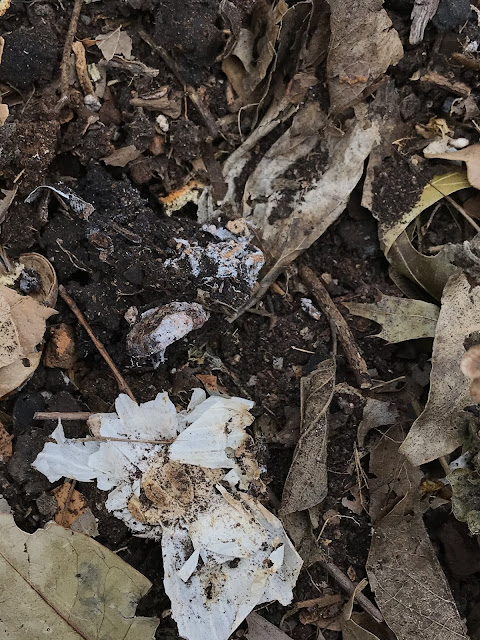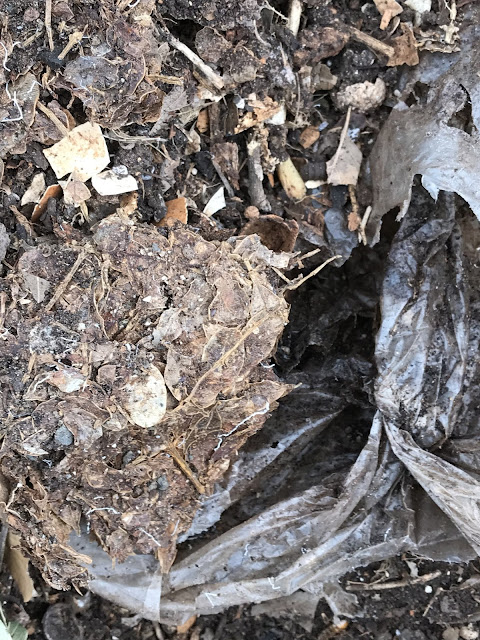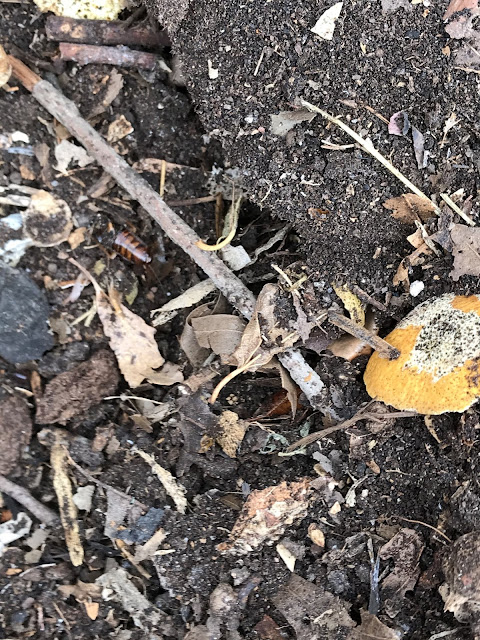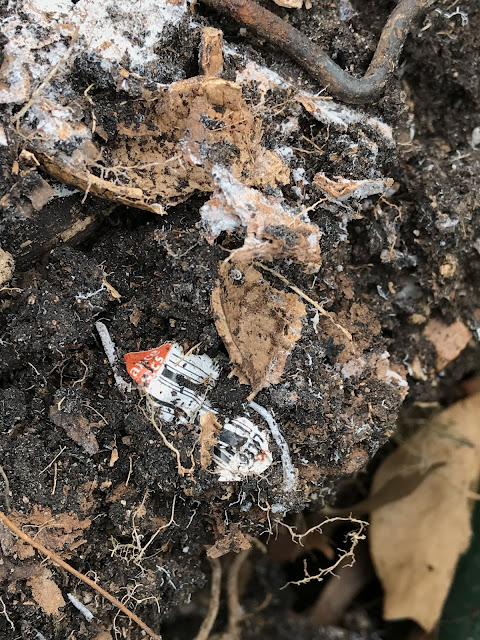When compost...doesn't
Here's some dirty truth about composting.
Composting is great for the environment as part of the Reduce-Reuse-Recycle approach to sustainability. However, recycling works best when seen as a last resort to the other two options, reducing and reusing. Meaning, if one throws out massive amounts of uneaten produce into one's compost bin each week, perhaps one might give some thought to reducing one's produce purchases. (Or garden production, for that matter.) We've done well in that regard, recently; nothing like a global pandemic to get one thinking about reusing what one already has inside one's home rather than going out to get more.
I've been composting for over a decade. I purchased a Miracle-Gro Biostack from Home Depot back in 2005 or so, when I first starting gardening in Austin in earnest. It's held up remarkably well. Of course they stopped manufacturing them shortly after I bought it, and I've always wanted more, and there's currently nothing else quite like it on the market. I saw a set of three on craigslist once, but I wasn't fast enough to snag them.
I've used a cold composting method because I generally don't have the time or the inclination to turn the bin, and watering a composting bin in perpetual drought doesn't seem wise to me. I haven't added any sort of additives to heat up the pile, although I have added a robust mix of "greens" to "browns", particularly after the oak leaves drop in fall. I've infrequently added large amounts of coffee grounds from a local coffee shop to the bin, and that really seemed to heat things up.
I've kept the bin covered unless rain was expected, and added kitchen scraps to it daily - mostly coffee grounds, citrus rinds and vegetable scraps. When oak leaves fall, I've saved them to mix in with the kitchen scraps, as long as they last. At the end of each season, I've added spent bean, pea, curcurbit and tomato vines, as long as they didn't look diseased.
To clear the fence line for the crew putting up the new wood privacy fence, I had to move the compost bin. I knew the top of the pile was full of leaves and freshly decomposing scraps, so I unloaded the top of the the pile into the new location.
As for the bottom of the pile that'd been cooking down for a while, I was hoping for some "black gold." I imagined I'd find something like this.
Sadly, what I found was this.
Jack took a look and proclaimed, "That looks like it belongs in a landfill."
I had to agree with him. None of this looked like anything I'd put on my garden.
There was lots of bits of plastic and paper, like twist ties and fractured plant tags,
lots of vegetable seeds and partially decomposed biodegradable compost crock bags.
Here we see a mass of roots, some healthy mold, some dry leaves and a compacted brick of various sorts of plant material.
Coffee filters, acorn shells,
every produce price sticker left on every fruit peel,
peanut shells,
avocado skins, more price stickers,
and some of it, I imagine, might make good compost with a lot more time and tending.
This is probably as close as I got to the rich compost I was wanting, and it is just chock-full of bits of eggshells. I see no evidence that eggshells break down in a home compost bin beyond fracturing into bits and falling to the bottom over time. If I sifted all the chunky stuff out, I might have a couple of quarts of compost.
Even the parts that looked closest to the fluffy dark mix I'd been hoping to find were dry and compacted. Yes, those are cockroaches. Cockroaches serve a purpose as master decomposers and nutrient recyclers.
After reviewing outcomes, I decided right then and there that I was done with home composting. What couldn't fit in the city composting bin went in the regular trash.
Commercial composting will break down all this plant material into usable compost in a fraction of the time I've spent, along with the bags, coffee filters and things that can't be thrown into a home compost bin, like bones and meat. I tried to pick out as much of the plastic and price stickers as I could. (Why on earth aren't those price stickers biodegradable?)
As for me, I'm rather relieved to be giving up home composting. Let the professionals deal with it.
If we didn't have access to composting through the city, it might be worth the effort to hot compost. But we do have access to commercial composting, so I don't feel as bad about stopping.
Words and photos © 2005-2020 Caroline Homer for "The Shovel-Ready Garden". Unauthorized reproduction is prohibited.
Composting is great for the environment as part of the Reduce-Reuse-Recycle approach to sustainability. However, recycling works best when seen as a last resort to the other two options, reducing and reusing. Meaning, if one throws out massive amounts of uneaten produce into one's compost bin each week, perhaps one might give some thought to reducing one's produce purchases. (Or garden production, for that matter.) We've done well in that regard, recently; nothing like a global pandemic to get one thinking about reusing what one already has inside one's home rather than going out to get more.
I've been composting for over a decade. I purchased a Miracle-Gro Biostack from Home Depot back in 2005 or so, when I first starting gardening in Austin in earnest. It's held up remarkably well. Of course they stopped manufacturing them shortly after I bought it, and I've always wanted more, and there's currently nothing else quite like it on the market. I saw a set of three on craigslist once, but I wasn't fast enough to snag them.
I've used a cold composting method because I generally don't have the time or the inclination to turn the bin, and watering a composting bin in perpetual drought doesn't seem wise to me. I haven't added any sort of additives to heat up the pile, although I have added a robust mix of "greens" to "browns", particularly after the oak leaves drop in fall. I've infrequently added large amounts of coffee grounds from a local coffee shop to the bin, and that really seemed to heat things up.
I've kept the bin covered unless rain was expected, and added kitchen scraps to it daily - mostly coffee grounds, citrus rinds and vegetable scraps. When oak leaves fall, I've saved them to mix in with the kitchen scraps, as long as they last. At the end of each season, I've added spent bean, pea, curcurbit and tomato vines, as long as they didn't look diseased.
To clear the fence line for the crew putting up the new wood privacy fence, I had to move the compost bin. I knew the top of the pile was full of leaves and freshly decomposing scraps, so I unloaded the top of the the pile into the new location.
As for the bottom of the pile that'd been cooking down for a while, I was hoping for some "black gold." I imagined I'd find something like this.
 |
| Pixabay stock compost photo |
Sadly, what I found was this.
Jack took a look and proclaimed, "That looks like it belongs in a landfill."
I had to agree with him. None of this looked like anything I'd put on my garden.
There was lots of bits of plastic and paper, like twist ties and fractured plant tags,
Here we see a mass of roots, some healthy mold, some dry leaves and a compacted brick of various sorts of plant material.
every produce price sticker left on every fruit peel,
peanut shells,
avocado skins, more price stickers,
and some of it, I imagine, might make good compost with a lot more time and tending.
This is probably as close as I got to the rich compost I was wanting, and it is just chock-full of bits of eggshells. I see no evidence that eggshells break down in a home compost bin beyond fracturing into bits and falling to the bottom over time. If I sifted all the chunky stuff out, I might have a couple of quarts of compost.
Even the parts that looked closest to the fluffy dark mix I'd been hoping to find were dry and compacted. Yes, those are cockroaches. Cockroaches serve a purpose as master decomposers and nutrient recyclers.
After reviewing outcomes, I decided right then and there that I was done with home composting. What couldn't fit in the city composting bin went in the regular trash.
Commercial composting will break down all this plant material into usable compost in a fraction of the time I've spent, along with the bags, coffee filters and things that can't be thrown into a home compost bin, like bones and meat. I tried to pick out as much of the plastic and price stickers as I could. (Why on earth aren't those price stickers biodegradable?)
As for me, I'm rather relieved to be giving up home composting. Let the professionals deal with it.
If we didn't have access to composting through the city, it might be worth the effort to hot compost. But we do have access to commercial composting, so I don't feel as bad about stopping.
I might pick up home composting on a very small scale at some point in the future but for now, I'm going to reuse the compost bin as a potato planter.
Words and photos © 2005-2020 Caroline Homer for "The Shovel-Ready Garden". Unauthorized reproduction is prohibited.


















I think even if you watered a bit more often and turned once a month it wouldn't have been like this. I do end up with the plastic stuff because I forget to take the labels off produce sometimes---and I definitely don't try any of the commercial things that say "compostable" because those are really meant for the commercial composting facilities and no one advertises it correctly. I hope you try again!
ReplyDeleteI don't do home compost myself any longer, but the one person I know of who has it down to a fine science and turns out the most beautiful, copious Black Gold you've ever seen, and on a regular basis, is Skylar of Tangly Cottage Gardening Journal.
ReplyDeletehttps://tanglycottage.wordpress.com/
A consummate gardener, she and her partner Allan are commercial gardeners as well as designing, planting and maintaining their gorgeous home gardens, filled with flowers, many grown from seed. I never miss the blog, giving it a big plus for the entertaining animal antics and artistic catios and other building projects, also.
I share your frustration with composting. It is impossible to get a good compost going without the addition of grass and we have none of that. I feel badly because when we had the wood bins and a chipper we managed to get some good stuff but it was a wretched job and when I said 'Sell it' one day it was gone by the end of the day. Then the wood rotted so D built some bins out of block. They look nice but don't function too well in so much as the only things eating it are the deer and the pill bugs. We have a hatchery of those at the bottom of the pile. It never seems to grow and yet we take out our food peelings etc every day-and kitchen roll. I want to sue the shredded paper but D says there is plastic in it. Next time. We need some browns in there. Yes! I could write my own story.
ReplyDeleteThanks for sharing your real-world experience with composting, Caroline. Now I don't feel bad about not making space for a compost bin. I've always been happy to know the City of Austin is composting our yard waste, and that's been good enough for me.
ReplyDelete